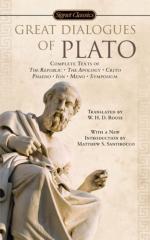
|
| Name: _________________________ | Period: ___________________ |
This test consists of 15 multiple choice questions and 5 short answer questions.
Multiple Choice Questions
1. In Republic: Book III, Socrates is first concerned with:
(a) The corruption of the youth.
(b) Methods of practicing medicine.
(c) A citizens' revolt.
(d) The end of the world.
2. The common man is not concerned with beauty itself, but ___________.
(a) He concerns himself with only practical matters.
(b) He is concerned with beautiful things.
(c) He is concerned with more abstract notions.
(d) He is concerned for his soul.
3. According to Socrates, what are the three parts of the soul?
(a) Thoughtfulness, mindfulness, and power.
(b) Rationality, spirit, and appetite.
(c) Goodness, badness, and curiosity.
(d) Hate, love, and desire.
4. Who gives the first speech at the symposium?
(a) Phaedrus.
(b) Agathon.
(c) Socrates.
(d) Eryximachus.
5. How are leaders chosen in Socrates' ideal republic?
(a) They would be elected by the common men.
(b) Every citizen would have equal access to political power.
(c) The richest members of the republic will lead it.
(d) They would all be the soldiers in training who appeared to love their city more than most.
6. According to Socrates, what happens when "one [is] mistaken in his judgment, and harms his friends, and helps his enemies, unknowingly"?
(a) He is just.
(b) It doesn't matter; one would never do this.
(c) He is unjust.
(d) He claims to know justice, but doesn't.
7. How does Polemarchus define justice?
(a) Being fair in all contexts.
(b) Allowing each man to live his life freely.
(c) Doing good to one's friends and evil to one's enemies.
(d) Stealing from the rich and giving to the poor.
8. What does Socrates assert about his views of the ideal state?
(a) They are without flaw.
(b) They will bring about the coming of a new empire.
(c) They are based on insidious accusations against the current ruling power.
(d) They break certain established social norms.
9. By the end of Book IV Socrates has still not proved _______________.
(a) Laws affect the flow of life.
(b) Courage comes from education and fear comes from ignorance.
(c) Justice is preferable to injustice.
(d) Justice manifests on earth.
10. Who said the following: "may not the art of which neither teachers nor disciples exist be assumed to be incapable of being taught?"
(a) Socrates.
(b) Meno.
(c) The slave boy.
(d) Meno's wife.
11. Who says, at the very end of Book II, "I completely endorse these patterns, and I would enact them as laws"?
(a) Socrates.
(b) Adeimantus.
(c) Thrasymachus.
(d) Glaucon.
12. Who is the character who narrates Symposium?
(a) Agathon.
(b) Appolodorus.
(c) Socrates.
(d) Alcibides.
13. How does Meno respond to Socrates' question: "Do bees differ as bees, because there are many different kinds of them; or, are they not rather to be distinguished by some other quality, as for example beauty, size, or shape?"
(a) "They're just bees. Who cares?"
(b) "I should answer that bees do not differ from one another, as bees."
(c) "I don't understand your question."
(d) "I should say that bees must differ from one another, as bees."
14. What does Socrates tell Ion about a person who can recite poetry well?
(a) Memorizing poetry is a way of balancing the soul.
(b) Ion must not know the meaning of poetry if he just memorizes it.
(c) Only a person who understands a poem's meaning could be a good reciter.
(d) Ion should memorize philosophy instead of poetry.
15. What definition of virtue do Meno and Socrates borrow from "the poets"?
(a) Virtue is the unmoved mover of all things.
(b) Virtue, like other abstract notions, resists our best attempts to define it.
(c) Virtue is the desire and power to obtain good things.
(d) Virtue is different for every person.
Short Answer Questions
1. Who are the rulers in Socrates' republic?
2. Who is Eryximachus?
3. Who is Asclepius?
4. What is a symposium?
5. What poet is cited by Cephalus to explain the paradox of old age?
|
This section contains 697 words (approx. 3 pages at 300 words per page) |

|




